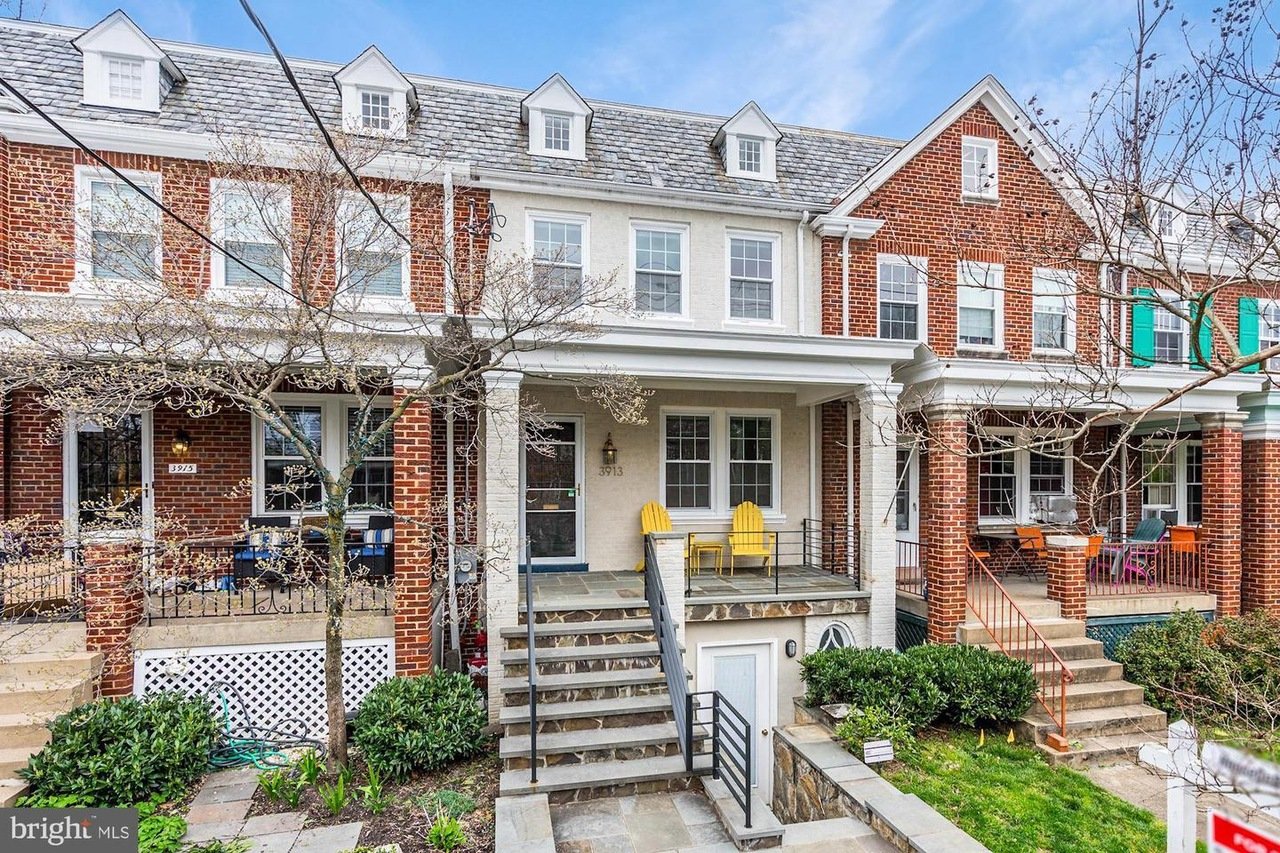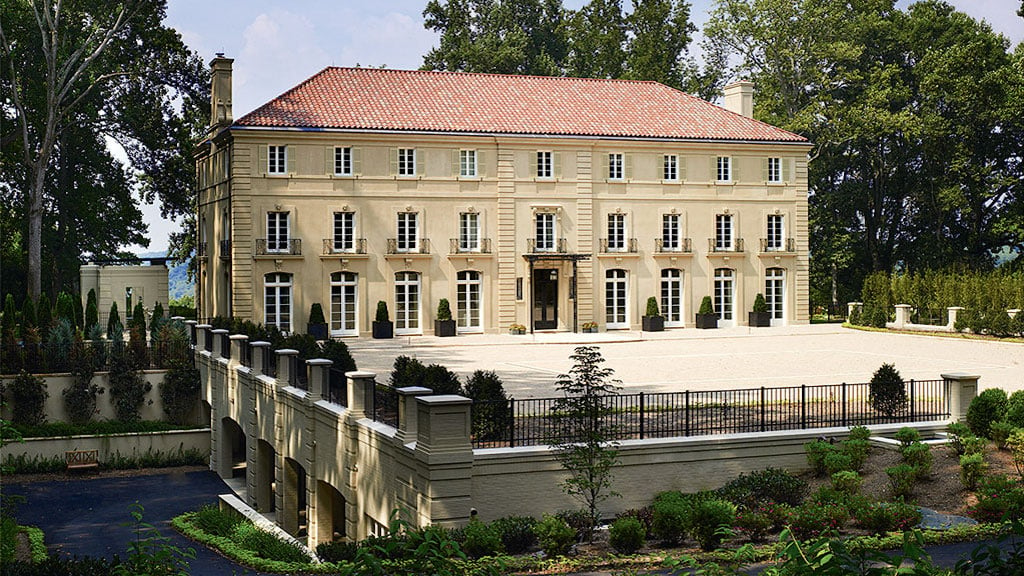"Kitchens have become the main room in the home," Karl Keul says. "I hear constantly from Washingtonians that when they entertain, everybody ends up in the kitchen."
Keul–whose Falls Church firm, Cameo Kitchens, remodels and installs about 150 Northern Virginia kitchens a year–says, "Guests feel less formal in the kitchen than in the living room. They open up a bit more. It's as if that's where you take only your real friends."
Keul was born in Bad Kissingen, Germany, in 1943 to an artistic family–some still own a gallery in Wiesbaden. His father, an oil painter, and his mother, a homemaker, sought to leave Germany after World War II. In 1950, a US Army major sponsored their move to North Carolina, where they lived in the officer's home for 18 months. Keul's father painted portraits and Bible scenes on church walls.
After learning English for a year, Keul began school. He quit at 17 to join the US Army, where he received his diploma. He later attended Appalachian State Teachers College in Boone, now part of the University of North Carolina system.
He came to Washington in 1965 for a job with a kitchen-cabinet wholesaler. After four years, he joined a small kitchen-remodeling company in Arlington owned by William Dembo. "Bill was a man of absolute integrity," Keul says. "He became something of a father to me."
During his 17 years there, Keul developed a following–"people calling in asked for me to do their kitchen, since I had done their friend's kitchen–that kind of thing." When Dembo died in 1984, "I felt like I could do this business, too." Keul and his wife, Bonnie, sold their small real-estate holdings to open Cameo Kitchens in 1985.
The firm now does up to $7 million in business a year, with 28 employees. Says Keul: "We have no interest in expanding our volume beyond 150 kitchens a year or expanding our staff beyond what we can control." Potential customers now wait seven to eight months before their kitchen installation can begin.
Cameo remains a family business. Keul's brother, George, has worked there for nearly 20 years. Two of Karl and Bonnie's three daughters are employees, too–Kelly is office manager, and Katie is secretary. Kory attends college in Richmond. One son, Greg, is a draftsman at Cameo. Their son-in-law, Lee Duer, designs and orders the cabinets and material. Two other sons live in California–Kevin, an artist, and Casey, a contractor.
After Keul inspected a kitchen installation in Arlington, we talked about what he's learned.
Why is kitchen renovation so popular?
Because of low interest rates and the perception that a remodeled kitchen is almost mandatory. When dishwashers first came out, they were a luxury; now they're standard. That's become the same with a remodeled kitchen. People like to modernize, get rid of older appliances and builder-grade cabinets, and get a real showplace. They want countertops that are easier to clean, more storage, and better appliances.
Many renovations happen because owners don't want to give up their existing homes for new ones, which they can get only way out in Loudoun County or wherever. They're in a place close to their work, and their home has appreciated a lot in value. They want to stay in their neighborhood but get a more modern kitchen.
What are the biggest mistakes in renovating?
One is to consider the renovation just another purchase. Remodeling a kitchen is different from buying a car. You can't get the same product from any number of dealers. Kitchens depend solely on the people who design and install them.
The most common complaint I hear is not about the quality of cabinets or appliances; it's about timeliness and quality of installation. There are many horror stories in this business, all centering on disorganization and bad installations.
The owner of a prominent local kitchen firm says that if a kitchen dealer tells you your installation will be done in less than six weeks, that person is lying. Well, very few of our kitchens take six weeks. Regardless of price, our standard installation is three and a half to four weeks from start to finish. We finish on time nearly all the time.
Can you really install a kitchen in three and a half weeks?
Our standard contract is for four weeks. We make that time frame easily. Remember, our installers work for us. We're not dependent on other people.
Our customers demand punctuality and professionalism. They're better educated than people in most other areas, with a much higher number of attorneys. Overall, our customers are very intelligent and ask detailed, insightful questions. We have to know our material inside and out.
How long does the design take, before the installation?
Some kitchens get designed in three or four hours. Some take days. It depends on the customer's ideas and the space available. It's hard to put lots of things into a small space and make it work without compromising.
What do people want in their kitchens?
First, plenty of counter space. Older kitchens generally had little. They had wall ovens and cooktops. If you put in a range instead, you immediately pick up 24 to 27 inches of counter space.
Second, many people want a work island. It has a comfortable feeling and opens up access from different sides. You can spread out.
How much does an average kitchen renovation cost?
In this area, around $45,000 to $55,000 for a really good design, top-grade cabinets, and a professional installation. On top of that comes the cost of new appliances. Intricate tile work can also get expensive.
What's the most expensive kitchen you've done?
A quarter of a million dollars. We renovated the fellow's kitchen and installed an office, bar, and sitting room–with lots of bookshelves, cabinets, and specialty work.
What's new in kitchens over the last 15 years?
Materials have changed. Fifteen years ago, we did mostly Corian and even Formica countertops. Now we're doing mainly granite. We do ceramic tile in nearly every kitchen, either as a backsplash or on the floor. We used to do mostly vinyl floors, which can be easily damaged. Today, ceramic tile is almost indestructible–it'll last many years. And most people prefer its natural look, whereas vinyl looks synthetic.
Corian is easy to keep clean and needs no sealing. Granite must be resealed every 18 months or so. And if not properly sealed in the first place, it will absorb some colors from spills. You don't have to worry about all this with Corian. Wipe it, and it's clean. My own home has Corian counters. If you leave a hot pan on Corian, it'll scorch the surface, but Corian can be buffed out. For $100 or so, someone will come and remove the mark.
We're seeing more wine coolers built into kitchens. They usually hold 24 bottles. We're also seeing fewer trash compactors. Out of the 140 or so kitchens we'll remodel this year, we'll install maybe one or two compactors. They've fallen out of favor, probably because trash stored up for a while starts to smell. And the bag becomes so heavy that it's hard to remove.
People want quieter dishwashers. Before, running your dishwasher would drive people out of the kitchen. Now, with a Miele or Bosch, you can hardly tell it's running.
More customers want a remodeled kitchen to be larger. The walls of the previous dining room get removed to make one big area. By taking out supporting walls, we can make a big room out of a small kitchen.
People find that makes entertaining easier. They realize they'll be entertaining in the kitchen anyway–that's where everyone ends up at any party–so they might as well have the space to do it well.
People nowadays run their kitchen cabinets right up to the ceiling. They want to use as much space for storage as possible. There are more roll-out shelves, spice racks, and custom features inside cabinets. People want to use every square inch of space.
What's your advice for someone considering a renovation?
Above all, know whom you're dealing with. Will they give me a lot of references? Get six to eight references from recently completed jobs. Check them out. You may be surprised at what you find.
Second, get a firm that has its own employees doing the installation. The trend is to use subcontractors. The kitchen company sells you the design, cabinetry, and countertops, maybe even the appliances. Then it turns you over to a different company to do the installation. That's great for the renovation company, since it ducks out of responsibility for the installation, but it makes it harder for the customer to end up with a happy kitchen experience.
Third, spend lots of time on your first appointment. Describe in detail what you really want in your kitchen. The contractor should listen hard and take notes. Do you want to remodel the kitchen in order to sell the home soon? Or live in it for years? Tell him your family's habits. How many are in your household? Do they generally eat at the table or on the run? Do you entertain a lot?
The discussion should take two or three hours. The contractor should take down every dimension of the room, then return to the office to have the kitchen designed around this family's likes and dislikes, based on the way they live.
In Fairfax Station, we must have done 10 or 12 kitchens in one subdivision, but every kitchen we've done in that neighborhood with similar houses looks different. Each was designed to suit that particular family.
If someone entertains a lot, they'll need more eating space, a larger refrigerator, and a different type of stove. I've had customers with back trouble–they shouldn't reach down to work an oven. They need a wall oven and cooktop. That'll drive the design of their particular kitchen.
If the contractor doesn't ask the right questions, he can't design the kitchen that's best for that family. The best thing a customer tells us is "This kitchen feels right. It's exactly what we wanted."
With some customers, we'll make two or three designs. We like to show them different ways to do their kitchen. They can then choose. Any of the designs would be fine, but they can best decide which one feels right.
We show customers an isometric sketch–a perspective drawing–and walk them through it. We explain what'll be inside every cabinet, how every inch of their kitchen will be used. This cuts down on, even eliminates, surprises.
Does that cost them more money?
No. We don't charge more for making several designs. Until recently, we didn't charge for making designs at all. Then we began to charge $250 to make the initial design. We did that since we became overwhelmed with business. We could no longer do free estimates, as each one may take 10 to 15 hours. Every sketch is hand-drawn. We don't use computers to design our kitchens or make our drawings.
Have you ever made big mistakes?
After 20 years in business, the cabinets we've made wrong wouldn't fill half of one of our work trucks. I'm talking maybe seven or eight cabinets total.
Does someone remodeling a kitchen recoup most of the cost when selling the house?
Yes, you generally get dollar for dollar what you put in. It's not like purchasing a car or furniture. You can use your kitchen and thoroughly enjoy it, realizing that you'll generally recoup all of your money.
What's your own kitchen like?
We bought a home in Burke in 1988, with a nice builder-supplied kitchen. Since then, we've replaced the countertops, but I've never taken the time to replace our cabinets. I'd like to remodel my kitchen, but I work about 70 hours a week and don't have the energy or time.
What have you learned overall about kitchen renovation?
That to do it well requires lots of time and attention to detail.
We have four designers in our little company–two have more than 20 years in the business. Before we present any design or quote to the customer, I go over the drawings and all of the figures. Nothing is presented that I don't personally go over.
After 40 years in the business, I've found that the key to success in kitchen remodeling is not to make mistakes. I keep on my desk a quote by Jay Leno: "It takes persistence to succeed. Attitude also matters. I have never thought I was better than anyone else, but I have always believed I couldn't be outworked."
It's not the money I do it for. It's the fact that our name is attached to each project. We've never done a kitchen I'm ashamed of.
Do you remember each kitchen?
Most, sure. People will call and say, "Karl, 15 years ago, you did my kitchen." They'll mention something and I'll say, "Oh, yeah, that's right by your refrigerator, which is on the south wall."
Your lessons of life?
Do your best for everybody and you can't go wrong.
Consider your career as something that will never be perfect. It requires constant thought and improvement.
Maybe it's because of that approach that we've never been let down by a customer. We've gotten paid on every single job. And we've never hired an attorney. We've never been sued or even threatened with a suit.
Somehow we've found a way to please our customers. That's why I sleep okay at night.
National editor Ken Adelman (adelmank@aol.com) has been conducting What I've Learned interviews since 1988. Disclosure: The author hired Cameo Kitchens in 1988 to renovate his kitchen.


















